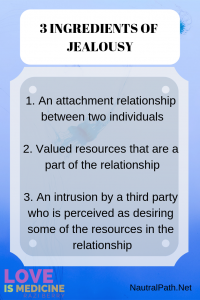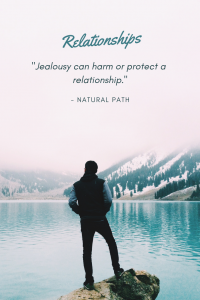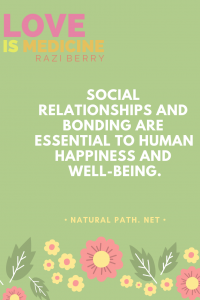Jealousy is powerful
Our bodies actually experience jealousy through physiological responses. The body has specific neural pathways and chemical responses that are elicited when a situation that triggers jealousy occurs.
Most people value monogamous relationships. As a species, we value commitment to a single partner. Many people end up in long-term committed relationships. Even in the beginning stages of a monogamous relationship, jealousy can occur.
Jealousy stems from separation from our preferred partner, our significant other. In a committed relationship, we tend to expect a certain level of commitment, attachment, and attention from our partners. When any of this is threatened, we may experience jealousy.
3 Factors of Jealousy
Jealousy is developed from 3 factors. These include:
- An attachment relationship between two individuals
- Valued resources that are part of the relationship
- An intrusion by a third party who is perceived as desiring some of the resources in the relationship

Basically, jealousy is created when 3 things occur at the same time. When a person who is not in the relationship is seen by one of the relationship partners as wanting some amount of the resources in that relationship (such as a partner’s attention, time, affection, etc.), jealousy may occur.
If you are in a relationship and you care about (or value) certain aspects of the relationship, you may end up experiencing jealousy if or when a third party threatens the relationship (even if they do so unintentionally).
Resources in a relationship may include any of the following:
- Time that is spent with your partner
- Conversations and communication with your partner
- Taking part in activities together (like watching movies, doing a hobby, going for a walk, or whatever other activity that you find enjoyable)
- Experiencing kindness and support from your partner
- Financial support
- Taking care of each other (ex: making a meal, watching the kids, etc.)
If any of these resources or any other aspect of a relationship you are in is potentially threatened, you may experience jealousy. A resource may be threatened if a person outside the relationship either does take on the resource (or some of the resource), or if they seem to want to take the resource out of the relationship.
Physiology of Jealousy
Jealousy is an internal experience that is impacted by our external environment. We feel jealousy within our minds as an emotion, but we also experience jealousy physiologically in our bodies. Although people often talk about emotions and how they feel regarding these emotions, the physical feeling of an emotion is often neglected.
If we learn to identify our physical experiences as they relate to our life experiences and emotions, we can help ourselves heal and thrive in life.
Studies have shown that partners who are separated from each other experience physical signs of distress. When a couple separates, whether for brief or extended periods of time, the body has physical changes that occur as a result of the separation. People in a committed relationship can also have physical changes in their bodies when they are near other people without their partner.1
When a couple is separated, the partners may have increased cortisol levels. Cortisol is known as a stress hormone. When a couple is separated for any reason, cortisol levels may rise for many weeks.1 When cortisol is high, this can have a negative impact on your body. For instance, you may gain weight more easily, you may be more likely to have poor eating habits, and increased blood sugar.
For more information on cortisol, check out the article, “Reduce Stress, Modulate Cortisol Level, and Support Adrenal Stress Adaptation.”
A relationship can protect you
Couples in a relationship often develop a special bond that helps to reduce the stress that the partners experience in day to day life. The actions of each partner can help to reduce general stress and increase safety and satisfaction in life for the other individual. When separation from the partner occurs, the couple can experience physical signs of distress leading to increased cortisol levels. The reward system of the brain may also be negatively impacted by long-term separation from a significant other (especially with the loss of a loved one through death or a break up).1
When experiencing jealousy, the pain receptors of the brain and body are activated, specifically in the brain area called the cingulate cortex. The lateral septum is an area of the brain that is associated with connections and bonding with others. When jealousy occurs, the attachment neurons in our brain are disturbed giving us a sense of social rejection.1,2
Jealousy can destroy a relationship

The lateral septum is related to protecting a partner and mating-induced aggression. The cingulate cortex is related to being territorial. When an individual sees their partner with another person and jealousy is triggered, the lateral septum and cingulate cortex are activated leading to potentially problematic behaviors, or at a minimum, feelings of wanting to protect and keep a loved one’s affection and connection.
Domestic violence can result from jealousy if a person doesn’t keep their reactions in check. However, on the other hand, jealousy can protect a relationship from harm and dissipation.2
Jealousy may be even worse when a direct threat is happening. In the instance of seeing your partner interacting with someone else, jealousy could sneak in and raise stress levels (and testosterone levels in males) leading to higher levels of jealousy.1
Jealousy can harm or protect a relationship.
The power of connecting
When connecting with your partner you can experience an increase in oxytocin, which is sometimes known as the “love hormone,” as it is often activated when couples physically connect or cuddle with each other.
Because of the physical symptoms that can be caused with the experience of jealousy, the body naturally can develop signs of illness such as lowered immune system. However, the opposite is also true.
Sometimes, when a person is ill, their illness may lead to more experiences of jealousy. Although their life experience will play a role in what the jealousy is about, the physical illness can lead to higher chances of being jealous due to the physical changes that occur in the body.
Being aware of how jealousy can develop and how it can show up in the body can help you to build a healthier relationship and improve your own well-being.
As a reminder, it is helpful to think of jealousy as occurring when 3 things exist:
- A current relationship or preferred individual is in mind
- There are aspects of the relationship and the other person that you cherish, and
- You think that another person outside the relationship is wanting to obtain those cherished resources from your partner or your relationship.
Jealousy is related to feeling like something of yours is being taken or may be taken away. In the instance of a relationship, jealousy makes you feel as if either your partner will be taken away or that parts of the relationship will be taken away.
It seems that jealousy can be helpful when experienced in mild forms because the experience of jealousy shows that you care about your partner. However, when jealousy gets out of hand and you feel threatened in situations that maybe should not result in so much emotional turmoil, it may be helpful to consider your triggers and feelings of security in your relationship.
Certain personality types may have higher chances of experiencing jealousy while others may be less apt to experience jealousy as often. Also, a history of unhealthy relationships or problematic childhood experiences may lead a person to experiencing more jealousy in adult relationships.3 Understanding your personal history, relationship style, personality, and triggers will help you in handling jealousy in a healthy way.
Is Jealousy Useful?
 It is okay to experience jealousy to a certain level because it shows you care about your partner but responding to this physical and emotional experience in a healthy and helpful manner is important to the quality of your relationship. Jealousy may help to preserve a relationship when handled in healthy ways.4
It is okay to experience jealousy to a certain level because it shows you care about your partner but responding to this physical and emotional experience in a healthy and helpful manner is important to the quality of your relationship. Jealousy may help to preserve a relationship when handled in healthy ways.4
Forming a bond with a special person can lead to physical improvements in motivational areas of the brain as well as brain glucose metabolism. Establishing a close relationship with someone may be one of the only non-pharmaceutical ways to improve certain areas of the brain while there are many things that can lead to the brain’s deterioration including aging, disease, and injury. Social relationships and bonding are essential to human happiness and well-being. 4
Jealousy can help a relationship stay intact or it can destroy the relationship if a person reacts in an unhealthy manner to their experience of jealousy. Jealousy is associated with physical changes in the body. While connection with a partner can lower stress, jealousy can increase stress hormones in the brain.
References:
- Hinde, K., Muth, C., Maninger, N., Ragen, B. J., Larke, R. H., Jarcho, M. R., Mendoza, S. P., Mason, W. A., Ferrer, E., Cherry, S. R., Fisher-Phelps, M. L., … Bales, K. L. (2016). Challenges to the Pair Bond: Neural and Hormonal Effects of Separation and Reunion in a Monogamous Primate. Frontiers in behavioral neuroscience, 10, 221. doi:10.3389/fnbeh.2016.00221
- Maninger, N., Mendoza, S. P., Williams, D. R., Mason, W. A., Cherry, S. R., Rowland, D. J., Schaefer, T., … Bales, K. L. (2017). Imaging, Behavior and Endocrine Analysis of “Jealousy” in a Monogamous Primate. Frontiers in ecology and evolution, 5, 119.
- Ravindran, A., Carney, M. W., & Denman, A. M. (1980). Systemic lupus erythematosus presenting as morbid jealousy. Postgraduate medical journal, 56(656), 419-20.
- Maninger, N., Hinde, K., Mendoza, S. P., Mason, W. A., Larke, R. H., Ragen, B. J., Jarcho, M. R., Cherry, S. R., Rowland, D. J., Ferrer, E., … Bales, K. L. (2017). Pair bond formation leads to a sustained increase in global cerebral glucose metabolism in monogamous male titi monkeys (Callicebus cupreus). Neuroscience, 348, 302-312.
Love is Medicine
Interested in learning more about how things like laughter can improve your health? Please join my Facebook group, Love is Medicine, where we explore the science of our emotions, intuition, and relationships and how it affects ourselves, each other, and the world around us. Love truly is medicine. I invite you to join me and learn more.
 Razi Berry is the founder and publisher of the journal Naturopathic Doctor News & Review, which has been in print since 2005, and the premier consumer-faced website of naturopathic medicine, NaturalPath. She is the host of The Natural Cancer Prevention Summit and The Heart Revolution-Heal, Empower and Follow Your Heart, and the popular 10 week Sugar Free Summer program. From a near death experience as a young girl that healed her failing heart, to later overcoming infertility and Chronic Fatigue Syndrome and Fibromyalgia through naturopathic medicine, Razi has lived the mind/body healing paradigm. Her projects uniquely capture the tradition and philosophy of naturopathy: The healing power of nature, the vital life force in every living thing and the undeniable role that science and mind/body medicine have in creating health and overcoming dis-ease. Follow Razi on Facebook at Razi Berry , join her Love is Medicine group to explore the convergence of love and health, and find more Love is Medicine podcast episodes here.
Razi Berry is the founder and publisher of the journal Naturopathic Doctor News & Review, which has been in print since 2005, and the premier consumer-faced website of naturopathic medicine, NaturalPath. She is the host of The Natural Cancer Prevention Summit and The Heart Revolution-Heal, Empower and Follow Your Heart, and the popular 10 week Sugar Free Summer program. From a near death experience as a young girl that healed her failing heart, to later overcoming infertility and Chronic Fatigue Syndrome and Fibromyalgia through naturopathic medicine, Razi has lived the mind/body healing paradigm. Her projects uniquely capture the tradition and philosophy of naturopathy: The healing power of nature, the vital life force in every living thing and the undeniable role that science and mind/body medicine have in creating health and overcoming dis-ease. Follow Razi on Facebook at Razi Berry , join her Love is Medicine group to explore the convergence of love and health, and find more Love is Medicine podcast episodes here.
